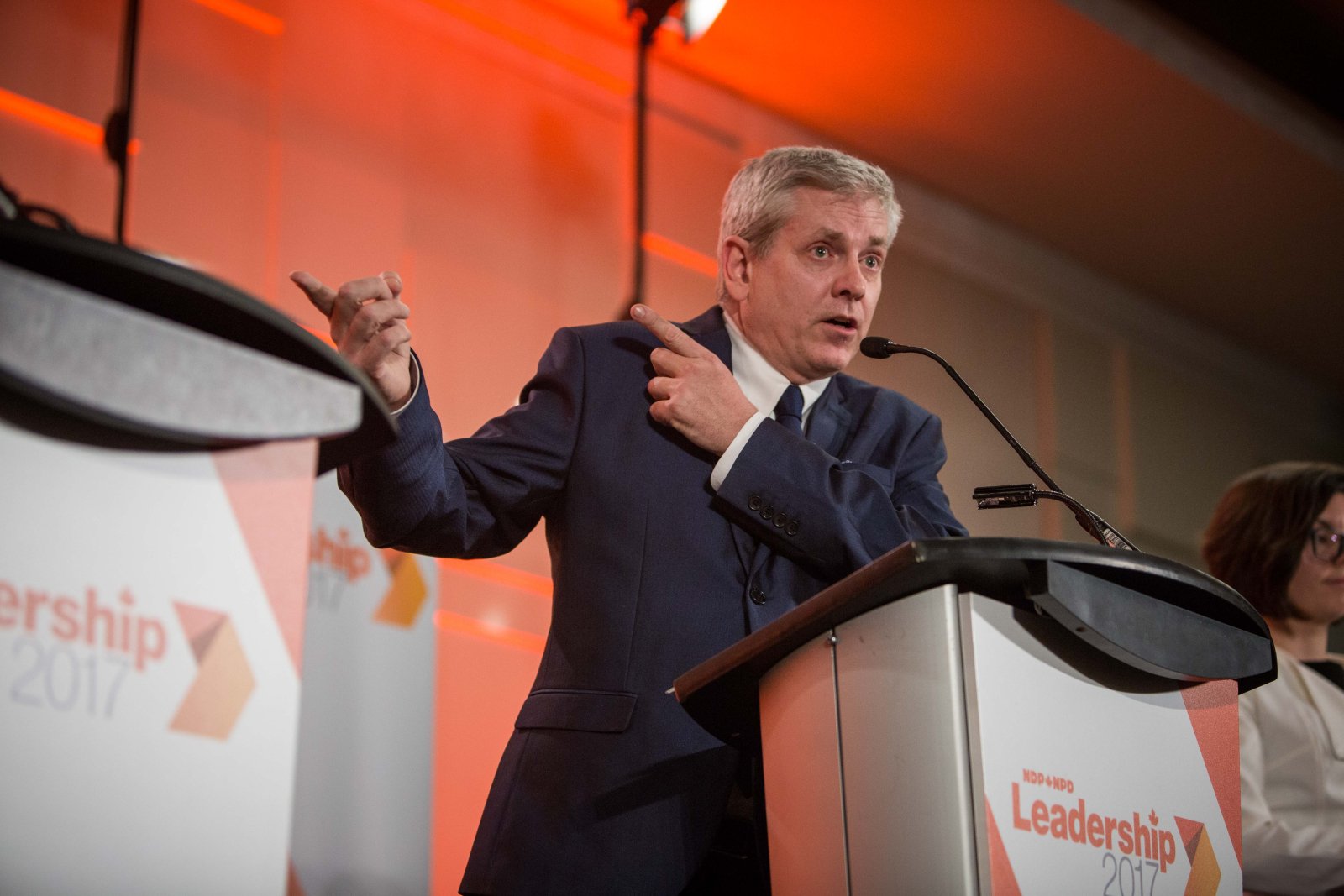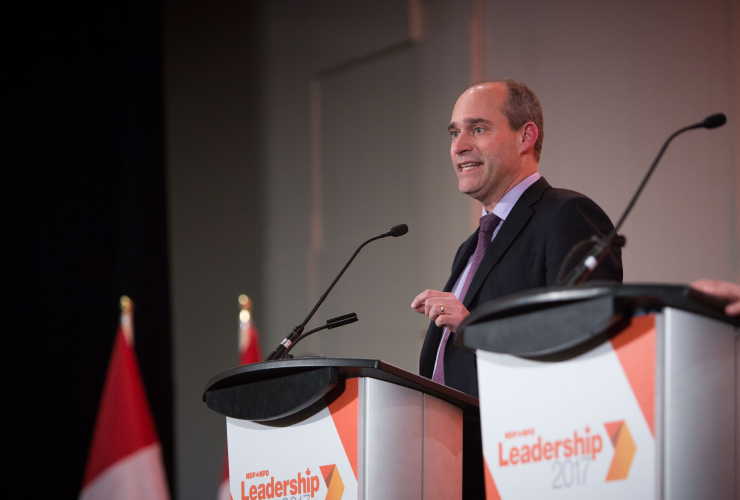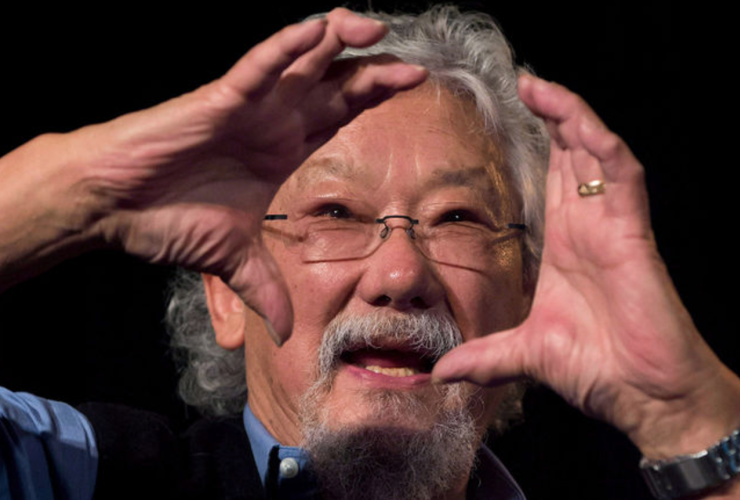Charlie Angus was inspired to enter politics the night a row of police officers confronted citizens blockading a massive garbage dump.
That was a cool Thanksgiving evening in October 2000. This Thanksgiving, 17 years later, he will be in the middle of the New Democratic Party's federal leadership vote.
Angus is one of four candidates racing to replace outgoing leader Tom Mulcair. One of his goals is "to make people believe in politicians," after years of policies that he says have prioritized "those at the top of the food chain."
Elected to the northern Ontario riding of Timmins—James Bay in 2004, he ran for office after an environmental protest put his friends and allies at risk of arrest. They were fighting a proposal to dump Toronto's waste into the open pit of the shuttered Adams Mine south of Kirkland, Ont.
"I realized that night that we should never have been put into a position of having to put families at risk by being on a blockade because public process failed us," Angus told National Observer. "All those guys in the fat ties and the women in the grey pant suits who were elected to represent the public interest signed off on an environmentally dangerous deal because it favoured the interests of lobbyists and insiders.
"I decided then we need people in politics who are there to represent the public interest. That began my career in politics."
Prior to that fateful evening, Angus had worked as a musician, book author, and activist. He has since found success as an NDP MP and his party's Indigenous and northern affairs critic. He was named as one of the 25 most influential politicians by Maclean's magazine in 2012.
He resigned both as critic and his party's caucus chair in November last year to prepare for the NDP leadership race, and in February, threw his hat into the ring. Other candidates include federal MPs Niki Ashton and Guy Caron, and Ontario MPP Jagmeet Singh.
Politics, says Angus, are fundamentally like activism. It's about harnessing that "street energy" and transforming it into practical policy that makes a tangible difference for Canadians, he said during a wide-ranging interview a few weeks before ballots are cast between Sept. 18 and Oct. 15.
His policy platform is the right mix for Canada, he argues, after years of neglect from Conservative and Liberal governments. Among his proposals are a national low income housing benefit, new rules to ensure the federal government cannot discriminate against Indigenous people and measures to end the amount of unstable, no-pension contract work within the federal government.
Angus proposes a national carbon budget to legislate a cap on climate-polluting greenhouse gas emissions and eliminate all government subsidies to the oil and gas sector. He also advocates creation of a Crown corporation dedicated to helping municipalities and provinces with sustainable development.
Here is a transcript of National Observer's interview with Angus, edited for length and clarity. It is the first of a series of interviews with NDP leadership contenders prior to the party's vote.
My relationship with Dr. David Suzuki comes from my work fighting toxic waste imports to north, documented in my book Unlikely Radicals pic.twitter.com/hlbwSctqAJ
— Charlie Angus (@CharlieAngusNDP) August 14, 2017
The last election in 2015 was disappointing for the NDP. What will you bring that’s new to the party, to freshen its face?
"The fundamental principle if we're going to be a social democratic party is that we have to be a democratic party. We became very centralized, very focused on the message box, on what was happening in the Ottawa bubble, and we became much more disconnected from our base.
"A social democratic movement has to be strong at the grassroots. We have to be out organizing the unorganized. We have to be speaking to and with people who are being written off the political and economic map of the nation. Otherwise, we’re just another version of the Liberals and Tories, but a little to the left. That’s not acceptable.
I’ve spent this whole campaign trying to work at the grassroots, find out who the organizers are, what are the grassroots issues we can bring to Ottawa to make people believe in politicians again. I think this is a fundamental question for New Democrats... As leader, I will be out in the field building that trust so that we can build a political machine that actually speaks for people, and gives people a reason to vote because they feel there’s a party that’s got their back."
Your platform includes a lot of policy for marginalized communities, like seniors, Indigenous children and the working poor. How do you feel about Guy Caron’s basic income pitch?
"I think it’s a very popular idea right now. I have a number of questions about basically giving everyone a basic wage and saying the world’s going to be better... but I’m glad we’re having that debate. Personally, my focus is to build livable and sustainable economies.
"My solution would be to invest in neighbourhood cooperatives, to establish support for creating economies at the grassroots where people can start to take control of their economic lives... I would implement social purchasing policy for government services. For the billions that we spend on infrastructure, I would insist that we have a community benefit lens for all big projects.
"For example, there’s a huge LRT project being put through the downtown of Toronto right now. That’s receiving an enormous amount of federal and provincial funds and the benefits will go to the big box stores and the condo developers. If we’re going to put that kind of resources into federal infrastructure in urban municipalities, let’s make sure there’s a commitment to mixed housing, to cooperatives, so that people can benefit from the federal investments.
"I think it’s really, really important that we start to look at livable urban environments. This is why I’ve pushed for a national housing plan. A national housing plan is doable because the federal government — Justin Trudeau — is going to receive a $4 billion surplus from the CMHC (Canadian Housing and Mortgage Corporation) this fall. What’s he going to spend that money on, Hornet super jets or reinvesting in a national housing strategy so that people can start to live in communities where they work?"

You’ve been on the ground speaking with a lot of energy workers in Alberta. How are you going to create jobs and reconcile your climate plan with concerns in Alberta that jobs are disappearing?
"The federal government has enormous tools at its disposal because it invests billions into industry. The number one location in the world right now to build a renewable solar economy is south central Alberta and south central Saskatchewan.... The federal policy has been to put all our chips on the wheel of Fort McMurray. We have to change that.
"We need to be working on urban environmental projects and urban economic projects...I would like to create urban neighbourhood ownership funds so that we can use the federal government, through micro loans and other supports, to build these creative, sustainable local economies.
"The other issue on jobs is a jobs pledge — you receive money from the federal government, you commit to creating jobs in Canada. That’s fundamental. We give Bombardier, we give GM, we give Irving massive amounts of federal funding, and we see with GM that they’re shipping the jobs to Mexico, we see with Bombardier that they’re shipping the jobs to Mexico. That’s not on, on my watch.
"We also have to deal with the rising precarious nature of work. The number one exploiter of temporary and contract work in the country is the federal government. They’ve got people on an endless hamster wheel of short-term work contracts when they should be entitled to permanent, full-time work. I will insist in all areas of federal jurisdiction that we close the loopholes that allow the contracting out of work and make sure that people are getting the proper employment they deserve."
Given your background as an environmental activist, and looking at the emissions statistics, did you think our intense focus on saying ‘yes or no’ to pipelines is misplaced in the overall scheme of meeting our international climate obligations?
"I really think that the problem in Canada is both on the right and the left as we focus on the specific project but not on the big picture. The issue of these specific projects are hugely important and I understand that from having fought specific projects over the years. But the only way to move forward is to say, ‘How do we meet our international goals?’
"To do that, we need legislation. We need a coherent framework and a willingness to invest in alternatives. That conversation just hasn't been happening in Ottawa, and if I’m leader, that will be one of the major conversations and one of the major policy areas I will push. We have to start talking about where we’re going as a nation in the long term to meet the goals that we have to meet. These can’t be punted off until it’s more convenient down the road. The climate crisis is on us now."
If the NDP were to form government, what would happen to pipeline projects that have already been approved, like Kinder Morgan's Trans Mountain expansion?
"Projects that have been approved and are on the ground being developed are still going to have to pass through the social license of people on the ground. So we shall see what happens on the ground with these projects.
"My concern is that we need a larger framework to deal with Canada’s dysfunctional relationship in terms of our attitude towards our international obligations. We signed international obligations to reduce greenhouse gas emissions, and we’ve made no credible steps to do that... What I’ve learned from growing up in a mining region is that the only way you deal with environmental change is you legislate. You never get compliance unless it’s legislated, and companies expect legislation.
"This is why I’ve called for the establishment of a national carbon budget council, like they have in the U.K., because it’s a system that works and has shown that we can get results. But we also need major investments in creating this diversified energy economy. I’m really surprised that the prime minister has dropped the ball on this.
"...Under the NDP, we will legislate the hard limits, we will make sure that any major energy project is reviewed through the lens of a national carbon budget and the effect on the carbon limits, but we will be putting in investments now to create this renewable economy because I’m not going to throw a generation of workers under the bus. You don’t get environmental justice without getting econonic justice and we need to be fighting for both."

Some have criticized Ottawa's top-down approach with carbon pricing. How would you balance provincial differences on tackling the climate change problem with the way you believe it should be dealt with?
"Carbon pricing is certainly one of the tools we need to be using. I’ve become very sensitive to the issue from having seen how the Wynne government in Ontario has completely botched their green energy strategy by supporting so many privatized energy operations that have jacked up the price of hydro substantially.
"When we talk about carbon pricing, one of the elements that we have to be talking about is the effect that it has on the marginalized, the poor, on seniors. Carbon pricing should be an incentive to make large corporate polluters clean up their act and find efficiencies. What I don’t want to see is people who can’t afford to pay their heating bills punished... I’m really interested in the Alberta government’s model where with the carbon tax, people are able to also get savings through investments if they make investments in local renewables. There are creative ways to make this work."
If elected as leader, you’ve promised to dismantle Indigenous and Northern Affairs Canada. Prime Minister Justin Trudeau just split INAC in two. Does that change anything for you?
"I’m finding it really cynical that we’re seeing the prime minister talking about decolonization and dismantling INAC, and creating two ministers where there was one, while the prime minister is at federal court trying to quash the order of the Canadian Human Rights Tribunal ordering them to end the systemic discrimination against Indigenous children.
"...There’s no tweaking Indian Affairs, there’s no moving the offices around or painting the walls a different colour that’s going to change 150 years of policy that has been about destroying the ability of Indigenous to control their own lives. We have to dismantle that department, we have to dismantle the Health Canada aspects that control Indigenous lives.
"Number one, I would put in place a child ombudsperson to protect Indigenous children’s rights with order-making powers to force government to deliver services when they;re refusing to respond to cases of need, such as the deaths of these young girls in Wapekeka. We just lost another young girl yesterday as a result of the federal government’s culpability — and they were found culpable — by the Human Rights Tribunal in the deaths of these children for refusing to put funding in place when it was needed.
"I would establish a full independent inquiry audit of spending at INAC because nobody has a clue how this operation works. It’s a black hole of unaccountability. The parliamentary budget officer tried, the auditor general has tried, committee studies have tried — we need a full picture of how this department operates, and then we need to begin a conversation with Indigenous communities across the country on how better to deliver those services."
Canada is a bit of a foreign policy lightweight, with a real heavyweight to the south. What’s your vision for Canada’s foreign policy?
"I think the question of Canada’s role on the international stage is of fundamental importance right now. We’re in a period of incredible instability around the world. The Trump administration has certainly upended all manner of international order and Canada needs to step up its game.
"Canada needs to restore credibility as a credible player through diplomatic efforts, through working with our allies at the United Nations, working in Europe with the Europeans to try and be a voice for moderation and a voice for conflict resolution. I think the prime minister is making a mistake by trying to act like Donald Trump’s favourite pet poodle, that somehow Canada will benefit and the Trump administration will like us.
"...I see a number of areas where Canada could play a role. This crisis in North Korea on the threat of nuclear war is terrifying and yet we see Canada refusing to play a role in nuclear disarmament at the UN. So Canada has to really change direction. I am also very concerned that Canada is becoming one of the world’s largest exporters of arms, particularly into the Middle East. I will establish an oversight body to make sure that any arms that Canada makes are not (sent) to conflict regimes or regimes with dodgy human rights records. I think the prime minister’s relationship with the House of Saud is just scandalous. We need to show that can be an independent voice for moderation, peace and reconstruction.
"What really disturbs me about the prime minister’s approach to China is that it seems to be an incredible naivety in terms of China’s enormous economic muscle, that our trade agreement to appease China’s interests in getting access to our resources, and also we see their purchase into the value chain of retirement homes gives them a foothold in our health industry. We need a strong open relationship with China but we also have to be very wary that China is a country that has not shown its willingness to play fair."






Comments